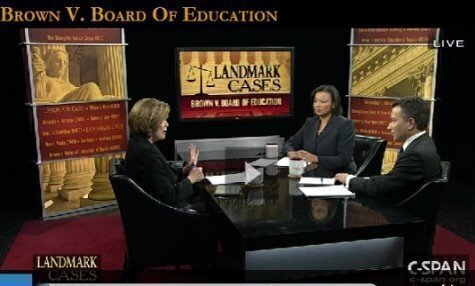In case you missed it the first time, the 12-part series "Landmark Cases" about the Supreme Court is re-airing on C-SPAN in prime time.
 Landmark Cases explores the human stories and constitutional dramas behind some of the most significant and frequently cited decisions in the Supreme Court’s history. This 12-part series delves into cases that represent some of the tipping points in our nation’s story and in our evolving understanding of rights in America.
Landmark Cases explores the human stories and constitutional dramas behind some of the most significant and frequently cited decisions in the Supreme Court’s history. This 12-part series delves into cases that represent some of the tipping points in our nation’s story and in our evolving understanding of rights in America.These cases include the first major Supreme Court decision, Marbury v. Madison, and concludes with a look at Roe v. Wade. Produced in cooperation with the National Constitution Center, the 90-minute programs will air each night on C-SPAN at 10 p.m. ET, from Monday, March 28 to Saturday, April 2 and Monday, April 4 until Saturday, April 9, 2016.
Here is a complete list of air times. For more information, go to http://landmarkcases.c-span.org/
Monday, March 28
10 pm
Landmark Cases: Marbury v. Madison (10/5/15)
Marbury v. Madison (1803) established the Constitution as the supreme law of the United States, asserting the Court’s power of judicial review. The Supreme Court found that federal courts have the power to invalidate acts of other branches of government when they violate the Constitution.
Tuesday, March 29
10pm
Landmark Cases: Scott v. Sandford (10/12/15)
Dred Scott v. Sandford (1857) denied blacks citizenship under the Constitution and invalidated the Missouri Compromise, Congress’ effort to balance slave and free states.
Wednesday, March 30
10pm
Landmark Cases: The Slaughter-House Cases (10/19/15)
The Slaughterhouse Cases (1873) limited the “privileges and immunities” of U.S. citizenship guaranteed by the newly enacted Fourteenth Amendment.
Thursday, March 31
10pm
Landmark Cases: Lochner v. New York (10/26/15)
Lochner v. New York (1905) is the namesake case of the “Lochner Era,” in which the Court struck down many state and federal regulations on working conditions.
Friday, April 1
10pm
Landmark Cases: Schenck v. United States (11/2/15)
Schenck v. United States (1919) helped define the limits of the First Amendment right to free speech, particularly during wartime. It created the “clear and present danger” standard, which explains when the consequences of speech allow the government to limit it.
Saturday, April 2
10pm
Landmark Cases: Korematsu v. United States (11/9/15)
In Korematsu v. United States (1944), the Supreme Court, in a 6-3 vote, upheld the government’s forceful removal of 120,000 people of Japanese descent, 70,000 of them U.S. citizens, from their homes on the West Coast to internment camps in remote areas of western and mid-western states during World War II.
Monday, April 4
10pm
Landmark Cases: Youngstown Sheet & Tube Co. v. Sawyer (11/16/15)
Youngstown Sheet and Tube Company v. Sawyer (1952) significantly curbed executive power when the Court overturned President Truman’s seizure of steel mills during the Korean War.
Tuesday, April 5
10pm – C-SPAN2
Landmark Cases: Brown v. Board of Education (11/23/15)
Brown v. Board of Education (1954) struck down the doctrine of “separate but equal” established by the earlier Supreme Court case, Plessy v. Ferguson. In Brown, the Court ruled racial segregation in public schools inherently unequal and unconstitutional based on the Equal Protection Clause of the Fourteenth Amendment.
Wednesday, April 6
10pm
Landmark Cases: Mapp. v. Ohio (11/30/15)
Mapp v. Ohio (1961) strengthened the Fourth Amendment protection against unreasonable searches and seizures, making it illegal for evidence obtained without a warrant to be used in a criminal trial in state court.
Thursday, April 7
10pm
Landmark Cases: Baker v. Carr (12/7/15)
Baker v. Carr (1962) established the right of federal courts to review redistricting issues, which had previously been termed "political questions" outside the courts' jurisdiction.
Friday, April 8
10pm
Landmark Cases: Miranda v. Arizona (12/14/15)
Miranda v. Arizona (1966) gave rise to the “Miranda warning” now issued upon arrest after the Court ruled 5-4 that suspects must be informed of their rights before they are questioned.
Saturday, April 9
10pm
Landmark Cases: Roe v. Wade (12/21/15)
Roe v. Wade (1973) determined that a woman’s right to have an abortion is protected under the Fourteenth Amendment right to privacy established by the previous Supreme Court case Connecticut v. Griswold. The Court ruled, however, that this right is not absolute; states can restrict an abortion based on the viability of the fetus.







